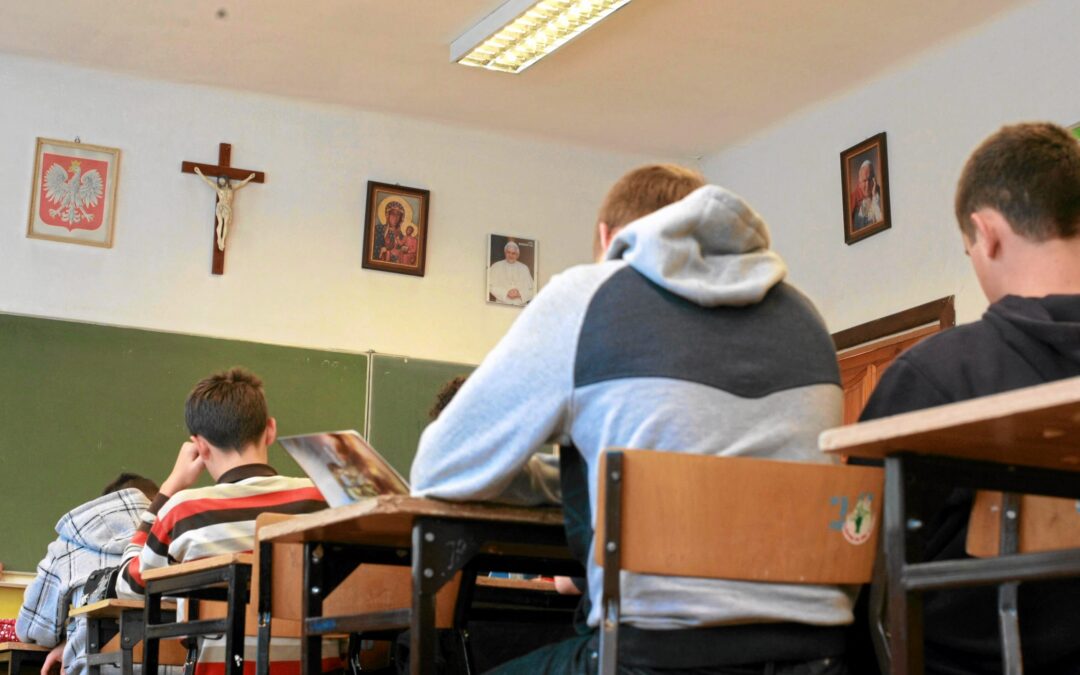Keep our news free from ads and paywalls by making a donation to support our work!

Notes from Poland is run by a small editorial team and is published by an independent, non-profit foundation that is funded through donations from our readers. We cannot do what we do without your support.
Poland’s Constitutional Tribunal (TK) has ruled that the government’s decision to halve the number of hours that Catholic catechism classes are taught in schools is unconstitutional because it was not agreed with the church.
However, the education ministry is likely to ignore the ruling – as it has done with previous TK judgments rejecting changes to the teaching of religion – because the government regards the tribunal as illegitimate due to the presence of unlawfully appointed judges.
Trybunał Konstytucyjny orzekł 3 lipca 2025 r., że rozporządzenie ministra edukacji narodowej – ograniczające od września br. lekcje religii do jednej godziny tygodniowo – jest niezgodne z Konstytucją. Minister arbitralnie ukształtował treść rozporządzenia – podkreślono w…
— Trybunał Konstytucyjny (@TK_GOV_PL) July 3, 2025
Religion classes have curriculums and teachers chosen by the Catholic church but are hosted and funded by public schools. The lessons are optional but are attended by most pupils in Poland, where 71% of people identify as Catholics. However, attendance has been falling.
When it came to power in 2023, the current government – a broad coalition ranging from left to centre-right – set out plans to halve the number of hours that religion is taught in schools from two hours a week to one. The measure is planned to go into effect at the start of the new school year this September.
The education minister, Barbara Nowacka, argues that two hours per week of religion classes is “excessive”, given that it is more than pupils have for some other academic subjects.
Her decision has, however, been strongly criticised by the church, which says it would “restrict the right of religious parents to raise their children in accordance with their beliefs” and is “unlawful” because it was made without agreement being reached between the government and the religious groups affected.
In a ruling announced on Thursday, the TK came down on the church’s side.
It found that Nowacka had not complied with the law regulating Poland’s education system, which states that the organisation of religious education must be decided in agreement with the Catholic church and other religious associations.
By doing so, Nowacka had violated a number of constitutional principles relating to respect for the law and also to “cooperation for the common good” between the church and state, found the TK.
The decision was made unanimously by a three-judge panel made up of the TK’s president, Bogdan Święczkowski, as well as Krystyna Pawłowicz and Stanisław Piotrowicz, who are both former MPs from the national-conservative Law and Justice (PiS), Poland’s main opposition party.
The Polish government has enacted a regulation halving the number of state-funded religion classes in public schools to one hour per week.
The change, criticised by the Catholic church as "unlawful", will come into force on 1 September 2025https://t.co/jj8nHDgLHd
— Notes from Poland 🇵🇱 (@notesfrompoland) January 20, 2025
However, the ruling is likely to have no impact in practice because the government has adopted a policy of ignoring TK rulings. It regards the tribunal as illegitimate due to the actions of the former PiS government, which unlawfully appointed three judges to the TK.
In two previous rulings, issued last November and in May this year, the TK found other changes that the education ministry has made to the organisation of religion classes to be unconstitutional. Both those judgments have been ignored by the government, drawing criticism from the Catholic church.
In a statement to the Polish Press Agency (PAP) in response to this week’s ruling, the education ministry said that it regards Nowacka’s decision on cutting the number of hours as being in force. It added that Nowacka had tried to “reach a consensus [with the church], but the bishops see themselves as having the right of veto”.
“For some time now, some of the people sitting on the [Constitutional] Tribunal have been trying, in cooperation with the bishops, to destabilise the education system,” said the ministry. “It is the minister responsible for education who shapes education law in Poland.”
Speaker of parliament @szymon_holownia has called on the ruling coalition, of which he is part, to end its boycott of the constitutional court and begin appointing judges to fill the growing number of vacancies https://t.co/UGcDWs2lZu
— Notes from Poland 🇵🇱 (@notesfrompoland) July 3, 2025
However, the spokesman for the Polish episcopate, Leszek Gęsiak, welcomed the TK’s decision, which he said is “is consistent with the opinion consistently expressed by representatives of the church”.
He also warned that, if the government ignores the ruling, the church “will take all possible and available legal steps, including in international institutions”, reports the Polish Press Agency (PAP).

Notes from Poland is run by a small editorial team and published by an independent, non-profit foundation that is funded through donations from our readers. We cannot do what we do without your support.
Main image credit: Rafał Michałowski/ Agencja Wyborcza.pl

Daniel Tilles is editor-in-chief of Notes from Poland. He has written on Polish affairs for a wide range of publications, including Foreign Policy, POLITICO Europe, EUobserver and Dziennik Gazeta Prawna.



















